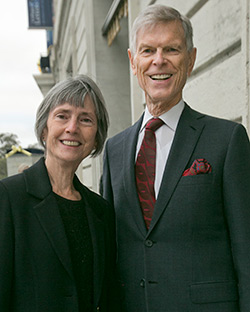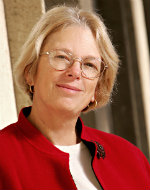By Andrew Cohen

Elizabeth Cabraser ’78 and Leo
Pircher ’57.
At an elegant and spirited affair, Berkeley Law’s dedicated donors gathered together to celebrate the successful close of an ambitious financial campaign.
The campaign’s champion, former Dean Christopher Edley, Jr., stepped down at the end of 2013 after serving nearly 10 years as leader during a remarkable transformation of the law school. He could not attend the April 12 celebration for the Campaign for Boalt Hall, but was ubiquitous throughout the festivities as the campaign co-chairs—Elizabeth Cabraser ’78, Professor Pamela Samuelson, and Leo Pircher ’57—revealed how his vision drove the campaign past its ambitious $125 million goal. The campaign had raised more than $130 million by the end of 2013, dwarfing all prior fundraising drives.
Cabraser called Edley “the right person at the right time.” Samuelson described him as “inspirational.” Pircher said he “fully understood the challenges” Berkeley Law faced and “how best to confront them.”
“Our law school is a place that encourages the exploration of possibilities, and Chris Edley certainly promoted the concept of infinite possibilities,” Cabraser said. “For all of these fantastic results, we have him to thank.”
Speakers at the glittering dinner and dancing event inside Memorial Stadium’s University Club trumpeted themes of gratitude, community, and celebration. Earlier in the day, Berkeley Law rededicated its Centennial Society donor wall with the addition of 49 new names.
“Normally I’m not that intrigued by walls, but I could stare at this one all night,” said Acting Dean Gillian Lester. “This monument ushers in our next 100 years of philanthropic culture.”
Pircher described meeting with Edley just three days into his deanship in 2004. “He said he would raise $125 million, and I said he was nuts,” Pircher recalled. “He said he had four goals: improve the school’s tired infrastructure, expand the faculty ranks to a size befitting a top law school, expand the financial aid offerings, and grow the school’s research centers.”
Lester and the co-chairs thanked the guests—some of the school’s most generous donors—for their integral role in helping them achieve each of the campaign objectives. In brief, Berkeley Law:
- finished a remarkable three-year construction and renovation project in 2011 that transformed its antiquated space, anchored by the 55,000-square foot South Addition;
- grew its full-time faculty by 23 percent, more than doubled the number of lecturers in residence, and greatly expanded the business law faculty. The school now provides 20 business law courses and a business law certificate, and will offer more than 270 courses overall next school year;
- dramatically increased its annual expenditures on financial aid—ensuring that exceptional applicants from all economic backgrounds have access to the law school, and freedom of career choice; and
- established nine of the school’s 15 research centers.

co-chair Professor
Pamela
Samuelson.
Representing scholarship recipients, Jessica Diaz ’14 thanked donors for being “essential in helping to bring in the kind of students that make Berkeley Law such a special place.” Christina Farmer ’14 conveyed gratitude on behalf of student organizations and journals, and Elliot Shackelford ’14 followed suit for the student-led Board of Advocates, which oversees the school’s internal and external skills competitions.
At the earlier donor wall rededication, Samuelson thanked contributors on behalf of the faculty and said their generosity “shows the kind of confidence you have in our future and in our present.”
After dinner, former dean and longtime professor Jesse Choper accepted a proclamation on Edley’s behalf from the Boalt Hall Alumni Association, which heralded his transformative leadership. “Chris has simply been extraordinary,” Choper said. “This wouldn’t have been attainable without him.”
Choper noted that when he was dean, “we had 60 percent state funding—now it’s around 10 percent. This isn’t a public university; it’s a moderately publicly-assisted university.”
Lester echoed that theme, cautioning that “we can’t rest on our laurels if we want to sustain our excellence.” She also framed what a philanthropic culture means to Berkeley Law, saying it enabled the school to “challenge convention, be inclusive, and strive to make an impact locally, nationally, and around the globe.”